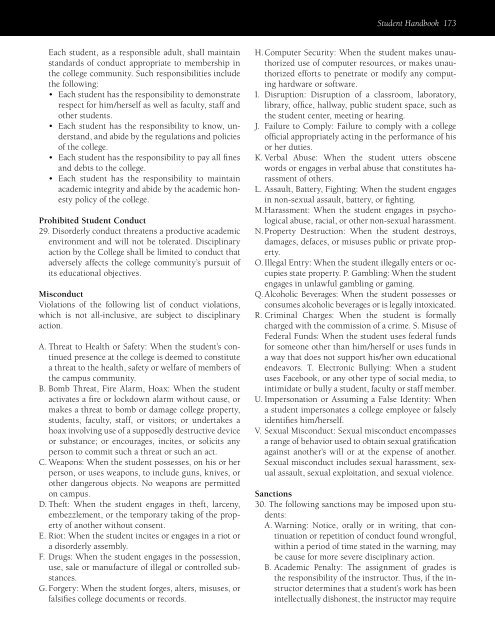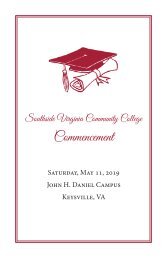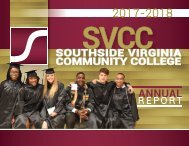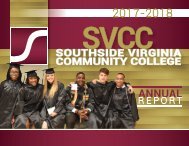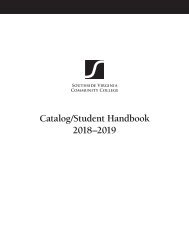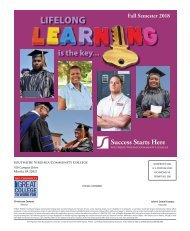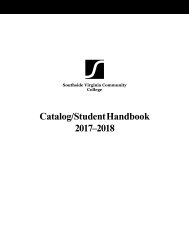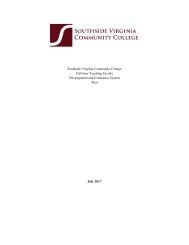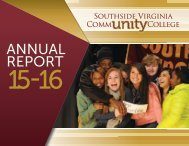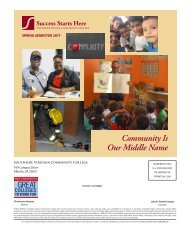SVCC Catalog 2017-2018
The programs and courses offered at Southside Virginia Community College. To learn more, go to www.southside.edu
The programs and courses offered at Southside Virginia Community College. To learn more, go to www.southside.edu
You also want an ePaper? Increase the reach of your titles
YUMPU automatically turns print PDFs into web optimized ePapers that Google loves.
Student Handbook 173<br />
Each student, as a responsible adult, shall maintain<br />
standards of conduct appropriate to membership in<br />
the college community. Such responsibilities include<br />
the following:<br />
• Each student has the responsibility to demonstrate<br />
respect for him/herself as well as faculty, staff and<br />
other students.<br />
• Each student has the responsibility to know, understand,<br />
and abide by the regulations and policies<br />
of the college.<br />
• Each student has the responsibility to pay all fines<br />
and debts to the college.<br />
• Each student has the responsibility to maintain<br />
academic integrity and abide by the academic honesty<br />
policy of the college.<br />
Prohibited Student Conduct<br />
29. Disorderly conduct threatens a productive academic<br />
environment and will not be tolerated. Disciplinary<br />
action by the College shall be limited to conduct that<br />
adversely affects the college community’s pursuit of<br />
its educational objectives.<br />
Misconduct<br />
Violations of the following list of conduct violations,<br />
which is not all-inclusive, are subject to disciplinary<br />
action.<br />
A. Threat to Health or Safety: When the student’s continued<br />
presence at the college is deemed to constitute<br />
a threat to the health, safety or welfare of members of<br />
the campus community.<br />
B. Bomb Threat, Fire Alarm, Hoax: When the student<br />
activates a fire or lockdown alarm without cause, or<br />
makes a threat to bomb or damage college property,<br />
students, faculty, staff, or visitors; or undertakes a<br />
hoax involving use of a supposedly destructive device<br />
or substance; or encourages, incites, or solicits any<br />
person to commit such a threat or such an act.<br />
C. Weapons: When the student possesses, on his or her<br />
person, or uses weapons, to include guns, knives, or<br />
other dangerous objects. No weapons are permitted<br />
on campus.<br />
D. Theft: When the student engages in theft, larceny,<br />
embezzlement, or the temporary taking of the property<br />
of another without consent.<br />
E. Riot: When the student incites or engages in a riot or<br />
a disorderly assembly.<br />
F. Drugs: When the student engages in the possession,<br />
use, sale or manufacture of illegal or controlled substances.<br />
G. Forgery: When the student forges, alters, misuses, or<br />
falsifies college documents or records.<br />
H. Computer Security: When the student makes unauthorized<br />
use of computer resources, or makes unauthorized<br />
efforts to penetrate or modify any computing<br />
hardware or software.<br />
I. Disruption: Disruption of a classroom, laboratory,<br />
library, office, hallway, public student space, such as<br />
the student center, meeting or hearing.<br />
J. Failure to Comply: Failure to comply with a college<br />
official appropriately acting in the performance of his<br />
or her duties.<br />
K. Verbal Abuse: When the student utters obscene<br />
words or engages in verbal abuse that constitutes harassment<br />
of others.<br />
L. Assault, Battery, Fighting: When the student engages<br />
in non-sexual assault, battery, or fighting.<br />
M. Harassment: When the student engages in psychological<br />
abuse, racial, or other non-sexual harassment.<br />
N. Property Destruction: When the student destroys,<br />
damages, defaces, or misuses public or private property.<br />
O. Illegal Entry: When the student illegally enters or occupies<br />
state property. P. Gambling: When the student<br />
engages in unlawful gambling or gaming.<br />
Q. Alcoholic Beverages: When the student possesses or<br />
consumes alcoholic beverages or is legally intoxicated.<br />
R. Criminal Charges: When the student is formally<br />
charged with the commission of a crime. S. Misuse of<br />
Federal Funds: When the student uses federal funds<br />
for someone other than him/herself or uses funds in<br />
a way that does not support his/her own educational<br />
endeavors. T. Electronic Bullying: When a student<br />
uses Facebook, or any other type of social media, to<br />
intimidate or bully a student, faculty or staff member.<br />
U. Impersonation or Assuming a False Identity: When<br />
a student impersonates a college employee or falsely<br />
identifies him/herself.<br />
V. Sexual Misconduct: Sexual misconduct encompasses<br />
a range of behavior used to obtain sexual gratification<br />
against another’s will or at the expense of another.<br />
Sexual misconduct includes sexual harassment, sexual<br />
assault, sexual exploitation, and sexual violence.<br />
Sanctions<br />
30. The following sanctions may be imposed upon students:<br />
A. Warning: Notice, orally or in writing, that continuation<br />
or repetition of conduct found wrongful,<br />
within a period of time stated in the warning, may<br />
be cause for more severe disciplinary action.<br />
B. Academic Penalty: The assignment of grades is<br />
the responsibility of the instructor. Thus, if the instructor<br />
determines that a student’s work has been<br />
intellectually dishonest, the instructor may require


